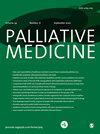实践回顾:晚期局限生命疾病成人严重慢性呼吸困难的药物治疗。
IF 3.6
2区 医学
Q1 HEALTH CARE SCIENCES & SERVICES
引用次数: 0
摘要
背景严重和难治性慢性呼吸困难是晚期局限性疾病患者的常见症状,也是一种沉重负担。设计对(国家间)指南和系统综述进行范围界定。此外,我们还搜索了未找到系统综述的主要研究。国际专家小组以 75% 的同意率就建议达成共识。数据来源:在 MEDLINE、Cochrane 图书馆和国际指南网络中搜索,搜索时间截至 2023 年 3 月。结果总体而言,8 项指南、14 项系统综述和 3 项随机对照试验 (RCT) 中有关抗抑郁药的证据有限。对于慢性阻塞性肺病、癌症和间质性肺病患者,支持使用阿片类药物的证据质量较低。至于慢性心力衰竭,目前尚无定论。苯二氮卓类药物仅适用于伴有严重呼吸困难的焦虑症患者。结论:呼吸困难的治疗仍然具有挑战性,只有少数几种药物可供选择,且证据有限且部分证据相互矛盾。因此,药物治疗应保留给晚期患者,在监测副作用、优化基础疾病并使用循证非药物干预作为一线治疗后使用。本文章由计算机程序翻译,如有差异,请以英文原文为准。
Practice review: Pharmacological management of severe chronic breathlessness in adults with advanced life-limiting diseases.
BACKGROUND
Severe and refractory chronic breathlessness is a common and burdensome symptom in patients with advanced life-limiting disease. Its clinical management is challenging because of the lack of effective interventions.
AIM
To provide practice recommendations on the safe use of pharmacological therapies for severe chronic breathlessness.
DESIGN
Scoping review of (inter)national guidelines and systematic reviews. We additionally searched for primary studies where no systematic review could be identified. Consensus on the recommendations was reached by 75% approval within an international expert panel.
DATA SOURCES
Searches in MEDLINE, Cochrane Library and Guideline International Network until March 2023. Inclusion of publications on the use of antidepressants, benzodiazepines, opioids or corticosteroids for chronic breathlessness in adults with cancer, chronic obstructive pulmonary disease, interstitial lung disease or chronic heart failure.
RESULTS
Overall, the evidence from eight guidelines, 14 systematic reviews and 3 randomised controlled trials (RCTs) on antidepressants is limited. There is low quality evidence favouring opioids in patients with chronic obstructive pulmonary disease, cancer and interstitial lung disease. For chronic heart failure, evidence is inconclusive. Benzodiazepines should only be considered for anxiety associated with severe breathlessness. Antidepressants and corticosteroids should not be used.
CONCLUSION
Management of breathlessness remains challenging with only few pharmacological options with limited and partially conflicting evidence. Therefore, pharmacological treatment should be reserved for patients with advanced disease under monitoring of side effects, after optimisation of the underlying condition and use of evidence-based non-pharmacological interventions as first-line treatment.
求助全文
通过发布文献求助,成功后即可免费获取论文全文。
去求助
来源期刊

Palliative Medicine
医学-公共卫生、环境卫生与职业卫生
CiteScore
7.60
自引率
9.10%
发文量
125
审稿时长
6-12 weeks
期刊介绍:
Palliative Medicine is a highly ranked, peer reviewed scholarly journal dedicated to improving knowledge and clinical practice in the palliative care of patients with far advanced disease. This outstanding journal features editorials, original papers, review articles, case reports, correspondence and book reviews. Essential reading for all members of the palliative care team. This journal is a member of the Committee on Publication Ethics (COPE).
 求助内容:
求助内容: 应助结果提醒方式:
应助结果提醒方式:


